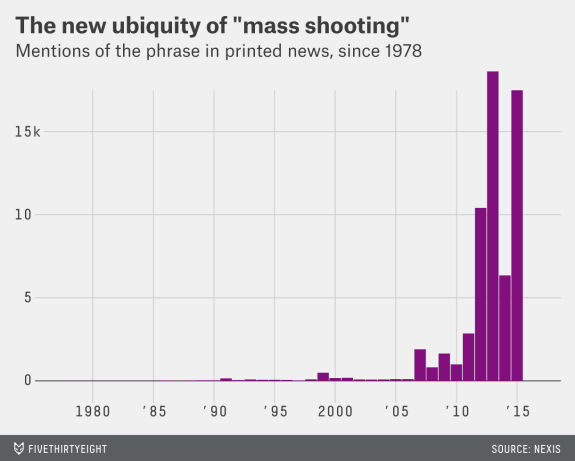The Creation of a Crime Wave
How mass shootings joined a "series of sensational crime categories that have been granted the media's intense spotlight"

James Alan Fox, a criminologist at Northeastern University, is one of the most vocal proponents of the idea that mass shootings have not been getting substantially more common. It isn't "the nature and number of incidents" that have really changed, he once wrote; it's "the extent and style of news coverage."
This argument usually appears when people are debating how many mass shootings there are. Now FiveThirtyEight's Oliver Roeder has come at the issue from a different direction: by trying to tally up that news coverage. Counting the number of times the phrases "mass shooting" and "mass shootings" appear in American newspapers, as compiled by the Nexis database, Roeder found a sharp increase in recent years:

Doing a similar count at the TV News Archive, Roeder found a similar pattern, though in that case his data don't go back as far. (His television numbers start in 2009.)
Contrasting those levels of media chatter with the numbers of actual shootings, as measured by Mother Jones, Roeder concludes that the crime has "increased somewhat" but not enough to account for the surge in press attention. He doesn't mention it, but the Mother Jones list tends to undercount earlier incidents, so even that apparent increase is overstated. But no matter which of the competing measurements of mass shootings you use, it's hard to disagree with Roeder's conclusion: "Rather than the phrase being used more often in order to simply cover more shootings, there is likely another force at work—the attention and interests of the media itself."
He doesn't merely mean that mass shootings are now covered more frequently and more intensively. He is suggesting that the media learned to treat "mass shootings" as a category, and at times to expand that category's boundaries. "It seems to me 'mass shooting' is a bit of a nebulous term," the linguist Ben Zimmer told Roeder. And that, Zimmer added, has "allowed journalists to use it as kind of a catch-all."
The sociologist Joel Best once wrote that "crime waves" frequently turn out to be little more than "waves in media attention: they occur because the media, for whatever reason, fix upon some sort of crime, and publicize it." Roeder strikes a similar note:
[Criminologist Kenna] Quinet sees the media's focus on mass shootings, and thus the flourishing of the phrase "mass shooting," as merely the next in an ongoing series of sensational crime categories that have been granted the media's intense spotlight. In the 1980s, for example, it was serial murder. At other times, it has been child abduction.
"It seems like we've stopped the hyperbole and epidemic talk about serial killers and we've switched over to talk about mass killers," Quinet said….
But the media's attention, and phrases of a given moment, are mutable. "Mass shootings"—and, one hopes, mass shootings—may wane. But, like nature abhors a vacuum, the media mill abhors a lack of grist, and it remains to be seen what events will become the next focus of attention. "What's the next crime phenomenon that's going to be hyped?" Quinet wondered.


Show Comments (17)